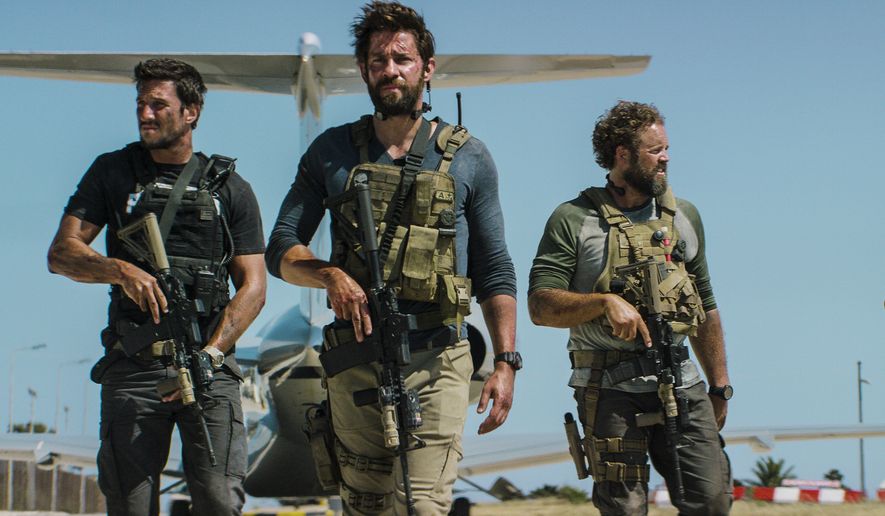ANALYSIS/OPINION:
Controversy over “13 Hours,” a film about the secret soldiers of Benghazi, reveals much about our nation’s politics and popular culture. Both are changing.
Michael Bay’s movie tells the story of American warriors who rushed to fight the terrorists attacking the U.S. diplomatic compound and secret CIA station in Libya on Sept. 11, 2012. Similar films — such as “American Sniper” and “Lone Survivor” — proved wildly popular, even though they were largely snubbed by Hollywood elites and derided by the left. But so far, box office numbers for “13 Hours” have been weak.
Yes, the movie has taken a good bit of trash talk. Writing for The Guardian, Jordan Hoffman called it a “bizarre mix of war pornography and dour isolationist posturing.” But other movies took that kind of flak, too. That’s not what’s keeping audiences away, Alisha Grauso argues in Forbes.
She points fingers at the studio’s marketing campaign, which played up the political implications of a movie that resurrects the tragic events in Benghazi at the same time Hillary Clinton, then secretary of state, was headed for the first presidential primary in Iowa. Hyping the politics, Ms. Grauso contends, detracted from the film’s appeal as a gritty tale about heroic and dedicated men at war.
What is noteworthy isn’t what’s driving audiences away from the film, but what’s not keeping them away: the fact that the hero warriors are paid, contract security guards. Unlike the active-duty sailors and soldiers in the other movies, these men are former military.
While there is lot of controversy over the accuracy of some plot elements of the film and the book on which it is based, there is scant criticism of the fighters themselves. Their evident patriotism, professionalism and bravery are uncontested.
This is a far cry from the “Bush’s Wars” era, when the left quite vocally abhorred the very existence of defense contractors. All contractors were greedy, cowboy mercenaries, they insisted. The names of corporate security contractors like Blackwater were used as curse words. Far-left filmmaker Robert Greenwald cranked out “Iraq for Sale: The War Profiteers.” The 2006 “documentary” had a limited theatrical release but played in thousands of “house parties” in the run-up to the 2008 elections.
The left hardly invokes the boogeyman of Uncle Sam’s mercenaries anymore. That’s largely because these contractors now work for their man in the White House.
The notion that private military contractors are the ugly, modern face of Ike’s military-industrial complex is largely a myth created by the left for political expediency — and quickly buried by them when it becomes politically inconvenient.
The “13 Hours” depiction of how contractors perform in combat is far closer to reality than the left’s fiction. By and large, contractors are effective and cost-effective. Further, the bravery exhibited by the contractors in Benghazi is not unprecedented. In practice, contractors in combat have proved every bit as brave and dependable as uniformed soldiers in Iraq and Afghanistan.
This gets to a really important issue. We are in a new age of warfare, one in which the private sector can generate military power to match modern states. Nations that can effectively harness that power will have a competitive advantage over those that treat it as a threat. Countries like the U.S. with a strong rule of law, experience in working with the private sector and a firm commitment to observe the Geneva Conventions are well-positioned to leverage the capacity that military contractors could provide.
Increasingly, America faces more and more adversaries using more and more dirty tricks: from employing real (i.e., illegal) mercenaries to assassination, kidnapping and other unsavory instruments of “hybrid warfare” and terrorism. The capacity to adapt and innovate is consequently more important than ever to our national security.
Finding the right capability and capacity is essential for mission success. Having the means to insource (with traditional armed forces) or outsource with contractors increases our ability to provide what is needed efficiently, effectively and responsibly.
• James Jay Carafano is director of The Heritage Foundation’s Davis Institute for National Security and Foreign Policy and the author of “Private Sector, Public Wars” (Praeger, 2008).




Please read our comment policy before commenting.